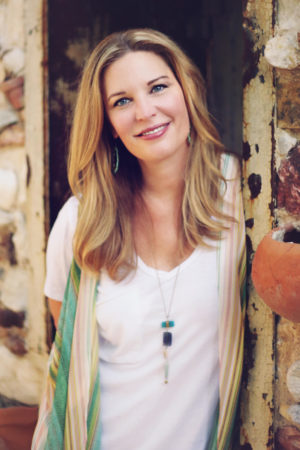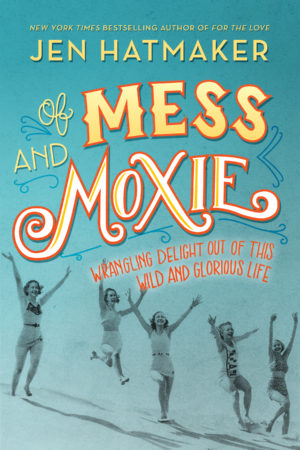Best-selling Christian author Jen Hatmaker voices the truths and challenges of womanhood in her eleventh book, Of Mess and Moxie.
By Amanda Pinney, Photos courtesy of Jen Hatmaker
 Superwoman Jen Hatmaker is a mom of five and a well-known author, motivational speaker, blogger, TV personality and a former cover woman. With her latest book Of Mess and Moxie, Hatmaker dedicated its content to women of all ages, lacing her personal experiences and struggles with the wisdom she’s gained as a Christian and a woman navigating the obstacles and victories of a well-lived life.
Superwoman Jen Hatmaker is a mom of five and a well-known author, motivational speaker, blogger, TV personality and a former cover woman. With her latest book Of Mess and Moxie, Hatmaker dedicated its content to women of all ages, lacing her personal experiences and struggles with the wisdom she’s gained as a Christian and a woman navigating the obstacles and victories of a well-lived life.
Austin Woman sat down with Hatmaker to chat about her spunky writing style (especially those witty and absurdly accurate how-to lists) and her belief in women overcoming stereotypes and embracing sisterhood.
Austin Woman: Tell us about the title of your new book. What inspired you to call it Of Mess and Moxie?
Jen Hatmaker: I chose that title because the truth is that life is a mess, and it’s good to tell the truth about that. There’s too much of a message going around, particularly to women, that there’s some sort of picture-perfect life to attain if you just get all the elements right, that if you do all the right things you’re going to end up with this really sort of pain-free life. It’s just a lie. Just because we have hard things in our life doesn’t mean we are doing it wrong, it just means we’re human beings. But there’s this parallel track that runs alongside it, and that’s why I chose the word “moxie,” this idea that life is indeed hard and messy, but women are smart and courageous and resilient, and that’s the truth too. If we’re going to tell the truth about the mess, I also want to tell the truth about the moxie.
AW: What sets Of Mess and Moxie apart from your previous books?
JH: At this point, eleven books in, I’ve lived longer, I’ve suffered, I’ve struggled, I’ve absolutely failed and I’ve learned from it. I’ve shifted and I’ve grown and some of my ideas have changed, and that’s all good. Of Mess and Moxie represents the most developed version of myself I’ve ever been.
AW: As an established author, how would you describe your writing style?
JH: One of my very first writing mentors from afar was Vicki Lovine, who wrote The Girlfriend’s Guide to Pregnancy and then the entire subsequent Girlfriend’s Guide series. I was 24 when I read her book, and that was the first time I’d ever seen a woman write about a serious subject, like childbirth, in a really funny, irreverent, sarcastic, winsome way. I remember thinking, can we do that, is that allowed? I write in the Christian space, so you know, that’s a fairly serious subject, Christianity. And so I didn’t know I had permission to write about something so sobering in a style that could be hilarious or warm or truthful and honest. So Vicki gave me permission years ago, long before I ever knew I was going to be a writer, and that’s been my style ever since.
 AW: You book is a compilation of how-to lists, recipes, hilarious anecdotes and heartfelt advice. What prompted you to put it together in that format?
AW: You book is a compilation of how-to lists, recipes, hilarious anecdotes and heartfelt advice. What prompted you to put it together in that format?
JH: My last two books have been in that format, and when I sat down to write, I asked a novel question that probably a lot of writers have asked themselves, which was “What kinds of books do I like to read?” and I realized how often I reach for books that are essentially essays. I knew I didn’t want to write 70,000 words on the same idea; I had too many things that I cared about, too many things that I wanted to talk about. After this many books I’ve written in virtually every format, and essay-format is my favorite for sure. I love it because some days I wake up and I really want to talk about something important, something meaningful and deep and vulnerable. And some days I wake up and I want to write about little league football. It gives me the opportunity to be this whole human being, this integrated person who sometimes really cares about faith and sometimes really cares about dinner. I was able to parlay all of those things into one book, and that’s exactly how I like to read.
AW: In your opinion, what is the most difficult challenge Christian women face in a modern society?
JH: One thing I see in my world is that typically in the Christian space, there’s this sort of spoken and unspoken prototype of what it looks like to be a woman, what it looks like to be a mom, what it looks like to be a wife, what it looks like to be in or out of a career — even what it looks like to be an advocate and an activist and where our allegiances and alliances are supposed to lie. There’s a template in which a great deal of us feel pressure to fit it, whether or not that goes against our personality type or life experience. There’s still this tension when you operate outside of those boundaries. I think for my generation, we’re in this process of, in a lot of ways, breaking some of those molds. This narrow description of being a woman does not necessarily make you faithful; that’s not the bulls-eye for Christian living. The truth is, there are women outside of those boundaries all over the place who are thriving and contributing, and they too are obedient and faithful in their lives. It’s exciting to be alive during this time and see women honestly challenging the spiritual status quo in ways that are really meaningful and really important.
AW: What is the main message you want women to take away from your book?
JH: I think the message that I hope they walk away with is, on the mess side of things, you’re not alone, you’re not the only one struggling — your story is not isolated and neither are you. There’s this great army of women who understand and care. Now the moxie side says, you can do this, you are strong and capable, you are loved by God and other women. We have this amazing community, and what we can do together is always better and stronger than what we can do alone. I hope it’s a message of hope and of inclusion and encouragement, and I certainly hope that at least once in the course of the reading, you laugh out loud.
AW: Any inspiration or encouraging words for aspiring authors?
JH: There’s always room for more. There’s always room for another book or idea, another style or personality. Whatever voice in your head that is telling you you don’t have what it takes or someone else has already written your book — that’s a voice not to listen to. Rather, you bring something unique to this world. Nobody can write exactly like you do, nobody has your exact story and nobody can tell it exactly like you tell it. There will never be an oversaturation of beautiful words in this world. Never. We can never have enough. It is worth it to pull your seat up to the table, put your fingers on the keyboard and get started.


